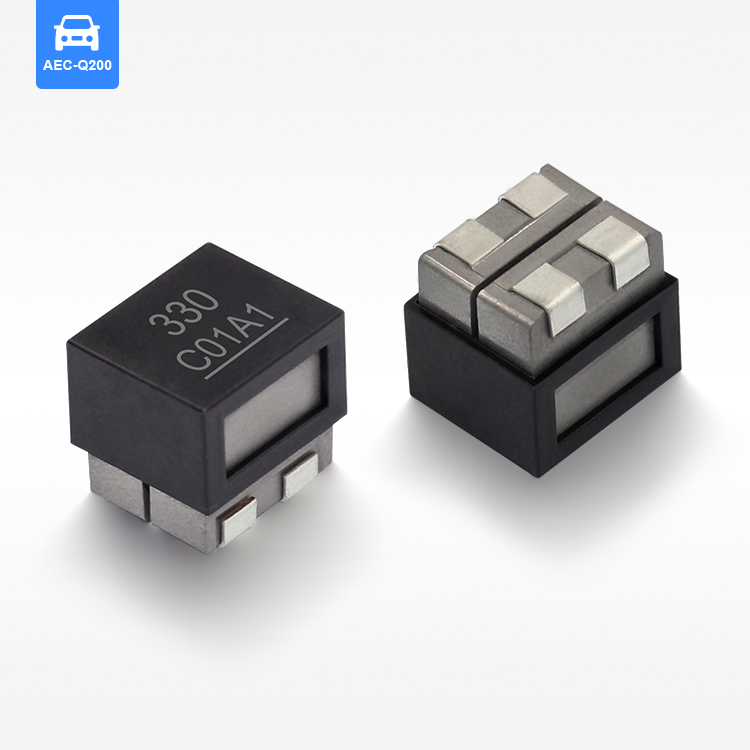Introduction
Automotive-grade digital power amplifier inductors are essential components in modern vehicle audio systems. These inductors are designed to handle large currents and provide stable performance under various environmental conditions, ensuring optimal sound quality. Typically involving ferrite bead designs, they are well-suited for high-power applications, such as digital amplifiers, where precision and reliability are critical. By providing refined current management, automotive-grade inductors contribute to an improved audio experience, making them indispensable in premium automotive sound systems. Furthermore, their robust construction ensures longevity and consistent functionality, even in demanding automotive environments.

CODACA automotive grade inductor VSAD series comprising models such as the VSAD0660, VSAD0880, and VSAD1010. With inductance values ranging from 1.50 to 47.0μH, Isat from 4.20 to 25.0 A, and Irms from 2.40 to 13.0 A, it is tailored to deliver an outstanding audio experience.

VSAD series digital power amplifier inductor innovative two-in-one shielding combination structure design. Two molding power chokes are assembled in the small package, it efficiently replaces two separate inductors typically satisfy PCB space saving required for noise filtering in Class D audio amplifiers.



Key Features of Durable Automotive-Grade Inductors
Automotive-Grade Certification & Compliance
Automotive-grade inductors require rigorous certification to ensure safety and performance in tough automotive environments. These certifications highlight the dependability and robustness of components used in vehicles. One of the most recognized standards is the AEC-Q200, which specifies that inductors must endure extreme temperatures, mechanical stress, and electromagnetic interference without failure. Compliance with such standards is critical; they ensure that inductors can reliably function over long periods, even under rigorous conditions. Manufacturers and industry experts unanimously agree on the importance of adhering to these certifications. This emphasis on compliance ensures the efficient operation of automotive systems, enhancing safety and reliability.
VSAD has been certified by AEC-Q200 for operation temperature range of -55℃~155℃, which means this SMD high current amplifier inductors meet the international passive component standard in automotive industry.
Enhanced Durability for Harsh Environments
In automotive settings, durability is paramount, necessitating the use of specialized materials and construction methods in inductors. Automotive-grade inductors are manufactured to resist temperature fluctuations, moisture, and mechanical wear. Standard inductors often fail in environments characterized by high temperatures, such as under the hood of a vehicle. In contrast, automotive-grade inductors are designed to excel in such demanding conditions. Statistics reveal that failure rates of standard inductors are substantially higher compared to their automotive-grade counterparts during rigorous testing. This resilience ensures that inductors can withstand conditions that would otherwise shorten their lifespan, thereby maintaining vehicle reliability.
High Current Handling Capabilities
Automotive-grade inductors are designed with specifications that allow efficient handling of high currents, a crucial feature for automotive applications. These inductors can dissipate heat effectively, making them more efficient than traditional inductors. High current handling capabilities ensure robust performance in power-demanding scenarios. Comparatively, traditional inductors may struggle with heat dissipation, leading to reduced efficiency and potential failures. Industry studies corroborate the superior performance metrics of automotive-grade inductors in real-world applications, emphasizing their indispensable role in today’s high power automotive systems. These advanced capabilities make automotive-grade inductors essential components for modern vehicles' electrical systems.
Design Considerations for Optimal Performance
Thermal Management in SMD Inductors
Thermal management is a critical aspect when designing SMD inductors due to the compact nature of surface-mount devices. The primary challenges include managing heat dissipation and ensuring that the inductor operates efficiently without overheating. Techniques employed to mitigate these challenges include utilizing high thermal conductivity materials and optimized inductor designs that enhance heat evacuation. Thermal resistance ratings are a key specification that helps predict the inductor's longevity and performance. Studies indicate that advanced thermal management techniques can extend the lifespan of inductors by up to 30%, ensuring reliable performance in demanding environments.
Applications in Modern Automotive Systems
Power Amplifiers in ADAS and Infotainment
In automotive systems, durable inductors play a crucial role in power amplification for Advanced Driver Assistance Systems (ADAS) and infotainment devices. These components are essential in ensuring the reliability and efficiency of modern vehicles, particularly in infotainment systems where high performance is critical. Automotive-grade inductors are designed to withstand harsh environments, providing seamless power regulation that enhances system reliability. Case studies have demonstrated the significant improvement in functionality that specially selected inductors bring to ADAS and infotainment technologies, underscoring their importance in automotive advancements.
FAQ
What are automotive-grade digital power amplifier inductors?
These are components designed for vehicle audio systems, handling large currents and maintaining performance in various conditions to ensure sound quality.
Why is AEC-Q200 certification important for these inductors?
AEC-Q200 ensures the inductors can withstand extreme temperatures, mechanical stress, and electromagnetic interference, crucial for reliable performance in harsh environments.
How do automotive-grade inductors enhance vehicle reliability?
They are designed to resist temperature fluctuations and mechanical wear, maintaining functionality in harsh conditions and reducing failure rates.
Why is thermal management crucial in SMD inductors?
Effective thermal management ensures SMD inductors do not overheat, maintaining their longevity and efficiency in compact designs.
What are the applications of these inductors in electric vehicles?
They are used in electric drive systems and battery management to handle high power loads required by electric vehicles efficiently.

